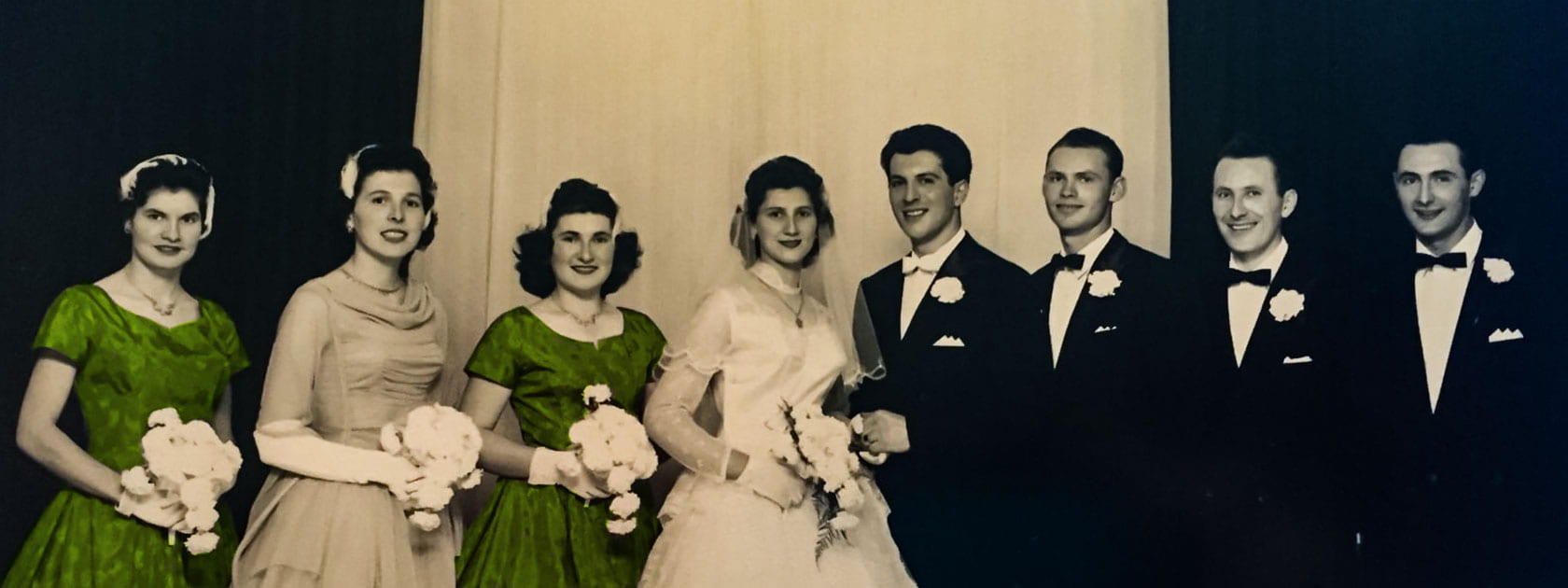Date
May 10, 2011
Maker
Columbus Centre
Accession#
ICEA2011.0015.0001
Interview With Leonard Tenisci
Leonard Tenisci is the son of internee, Fioravante (Fred) Tenisci who was born in San Leonardo, Abruzzo. His wife, Emilia (Emily) Tenisci (née Barazzuol) was born in Abbotsford, BC. The Tenisci family had 10 children and remarkably took many family trips together, including a vacation to Italy in 1962 when the children ranged in age from 16 to 2. Leonard is the second eldest and went to the University of British Columbia for Zoology before pursuing a career in photojournalism and acting. Fred Tenisci was interned before he was married, and was sent to Kananaskis, then Petawawa — writing daily letters to his fiancé that were eventually destroyed. Leonard recounts that when his father was arrested, he owned a retail shop full of religious items. Since his father had received short notice that he would be arrested, he went to Father Balo at St. Anthony’s parish whom held onto some of the expensive items for him in the church basement. Leonard explains that his father spoke about the lighter side of life in the camp, including the choir that he started as well as his interaction with the Mayor Camillien Houde. Leonard is disturbed and shocked that despite many letters of reference from the Archbishop, his father’s work, and the President of the Business Association in Trail his internment continued. The Royal Canadian Mounted Police (RCMP) told Fred that in order to prove that he was not an enemy to Canada he would have to join the Canadian armed forces. Fred accepted on the condition that he would not be sent to Italy to fight against his relatives and friends; however the police could not guarantee this so he accepted his fate in the internment camp. Leonard mentions that his father thought the police were very polite and that he held no grudges about his internment experience, and upon his release continued to be a very productive and positive member of the Trail community. Leonard has dedicated 15 years of his life towards promoting world peace as a result of his father’s experience during the war, and continues his work with transcendental meditation in countries around the world.
In this opening clip Leonard Tenisci introduces himself and speaks briefly about his parents and his siblings.
Leonard Tenisci shares stories from his childhood.
Leonard Tensici speaks about his father’s work at Cominco and a travel agency, as well as his appointment as a consular representative.
Leonard Tenisci speaks about his own education and career path.
Leonard Tenisci briefly speaks about the passing of his parents.
Leonard Tenisci speaks about the discrimination faced by Italians after the war. He also speaks about growing up with a strong sense of Italian identity.
In this clip Leonard Tenisci speaks about his father’s involvement with St. Anthony’s Church in Trail, BC and his mother’s involvement in the Catholic Women’s League.
Leonard Tenisci shares memories of his family vacations to Italy.
Leonard Tenisci continues to share memories from his trips to Italy.
Leonard Tenisci speaks about his father’s migration to Canada and his first experiences in the country.
Leonard Tenisci speaks about his father’s involvement in the Trail Maple Leaf Band.
In this clip Leonard Tensici speaks about his father’s involvement with fascism both in Italy and in Canada and how this eventually lead to his internment.
Leonard Tenisci briefly speaks about his father’s arrest and detention with other men from Trail, BC.
Leonard Tenisci recalls his parents’ courtship which took place during the war years. He shares that his father had made prior arrangements to have letters sent from camp to Father Bortignon who would pass the letters along to Emilia Barazzuol. However, Emilia’s mother found out about the plan and had the letters destroyed. Despite this experience the couple eventually got married.
Leonard Tenisci speaks briefly about his father’s camp experience and of the men he befriended in camp. He then goes on to tell the story of visiting one of these men after his release.
In this clip Leonard Tenisci shares what he knows about life in the internment camp. He also shares his father’s story of encountering Camillien Houde, the then Mayor of Montreal.
Leonard Tenisci shares stories of his father’s experience in the internment camps.
Leonard Tenisci speaks about his father’s connection to the three Ghislieri men who were also interned.
Leonard Tenisci explains that his father had received forewarning that he was going to be arrested and as a precautionary measure asked Father Balo to hide a number of religious items he was selling at his store in the church basement so that they would not be confiscated by the authorities.
Leonard Tenisci shares how his father was treated by the Italian and non-Italian community upon his return home.
Leonard Tenisci speaks about his father’s travel agency which he opened after the war and his role as consular representative in Canada.
In this clip Leonard Tenisci recalls singing Faccetta Nera, along with other Italian patriotic songs, at family gatherings as a child.
Leonard Tenisci recalls that his father put together a choir while in the internment camp.
Leonard Tenisci shares his feelings regarding the internment of Italian Canadian men during WWII.
Leonard Tenisci speaks about his father’s experience before the tribunal in Camp Petawawa where his father was told that he could prove his loyalty to Canada by joining the Canadian military.
Leonard Tenisci shares his father’s opinions on the internment and discusses how his father’s experience shaped him.
In this final clip Leonard Tenisci speaks about how his father was treated by the community in Trail after the war period.



